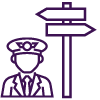Whether you’re a beginner or a professional pilot, we have something to offer everyone. Our training programs are flexible and customizable to meet the unique needs of each individual. Our training options include both online and in-person formats, which give you the option that best suits your needs. By joining Aviators of Tomorrow, you’ll have the opportunity to connect with a community of individuals who share your passion for aviation. Our community brings together aspiring pilots, experienced professionals, and aviation enthusiasts worldwide, fostering a network of like-minded individuals.
Joining Aviators of Tomorrow is a straightforward process. Please visit our website and register for our training programs. We will provide comprehensive guidance throughout the process, assisting you in embarking on your career path as a skilled aviator.
So what are you waiting for? Join Aviators of Tomorrow now and take the first step towards achieving your dreams of flying!






























